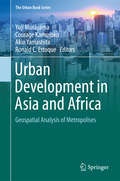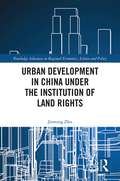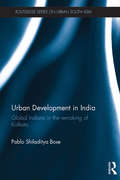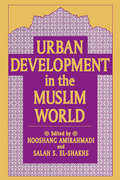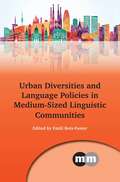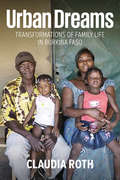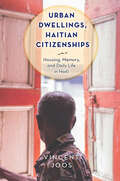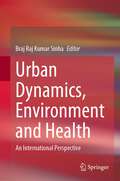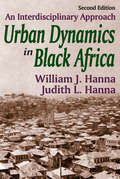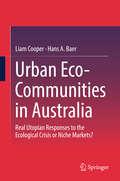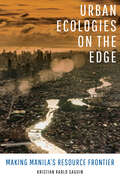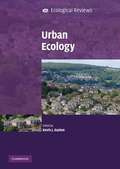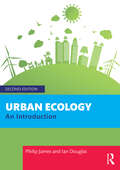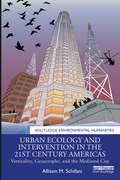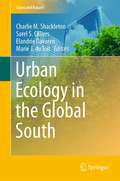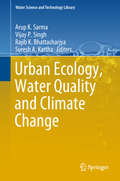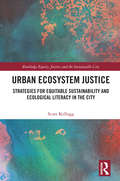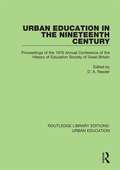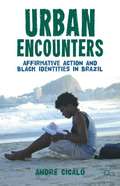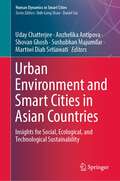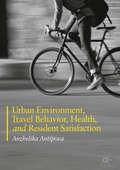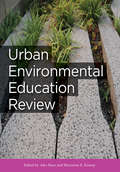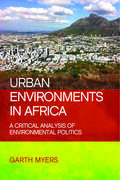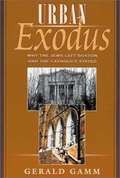- Table View
- List View
Urban Development in Asia and Africa
by Yuji Murayama Courage Kamusoko Akio Yamashita Ronald C. EstoqueThis book examines the urban growth trends and patterns of various rapidly growing metropolitan regions in developing Asian and African nations from the perspective of geography. State-of-the-art geospatial tools and techniques, including geographic information system/science and remote sensing, were used to facilitate the analysis. In addition to the empirical results, the methodological approaches employed and discussed in this book showcase the potential of geospatial analysis, e. g. land-change modeling for improving our understanding of the trends and patterns of urban growth in Asia and Africa. Furthermore, given the complexity of the urban growth process across the world, issues raised in this book will contribute to the improvement of future geospatial analysis of urban growth in the developing regions. This book is written for researchers, academicians, practitioners, and graduate students. The inclusion of the origin and brief history of each of the selected metropolitan regions, including the analysis of their urban primacy, spatiotemporal patterns of urban land-use changes, driving forces of urban development, and implications for future sustainable development, makes the book an important reference for various related studies.
Urban Development in China under the Institution of Land Rights (Routledge Advances in Regional Economics, Science and Policy)
by Jieming ZhuHow have the development and redevelopment of China’s cities since the early 1950s transformed the settlements and fortunes of a fifth of the world’s population? Rapid urbanization since the 1980s has changed the nation from a rural society to an urban one, marking it as one of the most significant transformations in history. As a country with severe land scarcity, land resources are intensively contested for during urbanization under the new regime of marketization. This book focuses on the impact of the institution of land rights that have transitioned from private ownership to socialist state ownership, and subsequently to public land leasing in the urban domain, and to collective ownership in rural areas. In the context of defining the relationship between the state and the market, the gradualist transition of land rights gives rise to intriguing processes of place-making. The elaboration of these processes will engage several revealing conceptual notions: land as a means of production, land commodification, ambiguous land rights, incomplete land rights, trading land use rights for land development rights, institutional uncertainty, land rent seeking and dissipating, local developmental state, danwei-enterprises, and more. The newly created landed interests are embedded intricately within the urban spatial structure. This book would especially be of interest to scholars interested in developmental economics, urban planning, geography, public policies, public management, and sociology, and also practitioners focusing on development and planning.
Urban Development in India: Global Indians in the Remaking of Kolkata (Routledge Series on Urban South Asia)
by Pablo Shiladitya BoseIndian diaspora has had a complex and multifaceted role in catalyzing, justifying and promoting a transformed urban landscape in India. Focussing on Kolkata/ Calcutta, this book analyses the changing landscapes over the past two decades of one of the world’s most fascinating and iconic cities. Previously better known due to its post-Independence decline into overcrowded poverty, pollution and despair, in recent years it has experience a revitalization that echoes India’s renaissance as a whole in the new millennium. This book weaves together narratives of migration and diasporas, postmodern developmentalism and neoliberal urbanism, and identity and belonging in the Global South. It examines the rise of middle-class environmental initiatives and Kolkata’s attempts to reclaim its earlier global status. It suggests that a form of global gentrification is taking place, through which people and place are being fundamentally restructured. Based on a decade’s worth of field research and investigation in multiple sites - metropolitan centers connected by long histories of empire, migration, economy, and culture - it employs a multi-methods approach and uses ethnographic, semi-structured interviews as well as archival research for much of the empirical data collected. Addressing urban change and policies, as well as spatial and discoursive transformations that are occurring in India, it will be of interest to researchers in the field of urban geography, urban and regional planning, environmental studies, diaspora studies and South Asian studies.
Urban Development in the Muslim World
by HOOSHANG AMIRAHMADI and SALAH S. EL-SHAKHSWar and revolution have focused the world's attention on the Middle East. Despite the headlines, the editors of this book state, the economic, political, and cultural aspects of urban life in the Muslim world are hardly known to us. Contributors to this volume explore urban problems, urban development, and the practice of urban planning in the Muslim world.In both comprehensive analyses and detailed case studies, the contributors address the basic dilemma of development planning: how to integrate the force of tradition with the demands of modernity. Specifically, some of the topics covered include the examination of the idea of a uniquely Islamic city; the influence of Islam on the medinas of Tunisia and Morocco and on the development of Mecca and Delhi; and reconciling tradition and modernism in Tehran.Also covered are the comparative development of Sana'a and Cairo; the influence of oil on urbanization in the Persian Gulf; urban growth in Syria; and an overview of urban planning in the Arab world. This compendium is essential for specialists and students of the region, for international planning and development practitioners, and for those seeking insight into the complexities of this important but arguably least understood region of the world.
Urban Diversities and Language Policies in Medium-Sized Linguistic Communities
by Emili Boix-FusterThis book examines medium-sized linguistic communities in urban contexts against the backdrop of the language policies which have been implemented in these respective areas. The authors provide new data and reflections on these linguistic communities which have languages somewhere in between the majority and minority, and re-evaluate the opposition between 'majority' and 'minority'. The book focuses on seven European cities, providing detailed information on their current situation and on the corresponding evolution of their linguistic repertoire. The book aims to improve our understanding of how and why languages live and decay, and of how intercultural cities, where communities show interest in each other's culture and language, can be better developed and encouraged.
Urban Dreams: Transformations of Family Life in Burkina Faso
by Claudia Roth† Willemijn De Jong Manfred Perlik Noemi SteuerClaudia Roth's work on Bobo-Dioulasso, a city of half a million residents in Burkina Faso, provides uniquely detailed insight into the evolving life-world of a West African urban population in one of the poorest countries in the world. Closely documenting the livelihood strategies of members of various neighbourhoods, Roth’s work calls into question established notions of “the African family” as a solidary network, documents changing marriage and kinship relations under the impact of a persistent economic crisis, and explores the increasingly precarious social status of young women and men.
Urban Dwellings, Haitian Citizenships: Housing, Memory, and Daily Life in Haiti (Critical Caribbean Studies)
by Vincent JoosUrban Dwellings, Haitian Citizenships explores the failed international reconstruction of Port-au-Prince after the devastating 2010 earthquake. It describes the failures of international aid in Haiti while it analyzes examples of Haitian-based reconstruction and economic practices. By interrogating the relationship between indigenous uses of the cityscape and the urbanization of the countryside within a framework that centers on the violence of urban planning, the book shows that the forms of economic development promoted by international agencies institutionalize impermanence and instability. Conversely, it shows how everyday Haitians use and transform the city to create spaces of belonging and forms of citizenship anchored in a long history of resistance to extractive economies. Taking readers into the remnants of failed industrial projects in Haitian provinces and into the streets, rubble, and homes of Port-au-Prince, this book reflects on the possibilities and meanings of dwelling in post-disaster urban landscapes.
Urban Dynamics, Environment and Health: An International Perspective
by Braj Raj Kumar SinhaThe comprehensive volume focuses on spatial, temporal, conceptual and empirical approaches to various elements of urban dynamics, environment and urban health. It demonstrates a multidisciplinary account of the significant dimensions of urbanization and urban life. Chapters by leading international experts are presented in sections on urban dynamics, Urban Environmental Issues, Urban Health Problems and Urban Development, Planning and Policies. Each chapter provides a breadth of information on conceptual and empirical studies of urban issues. It enables the readers to understand the interconnections of various vital elements of each urban-related topical issue locally, regionally and globally. Extensive maps, charts, diagrams and tables as cartographic tools facilitate the reader’s understanding. It also outlines an action plan for policy program change in both the developed and less developed countries toward sustainable urban development and environment for better health, prosperity and quality of life of the present and future urban population. It is an indispensable reference for students, research scholars of geography and environmental, medical, and social sciences at undergraduate and postgraduate levels.
Urban Dynamics in Black Africa: An Interdisciplinary Approach
by William J. HannaUrban Dynamics in Black Africa presents a succession of worlds where we can study the development and the crystallization of major social change. The authors trace the development of former villages, towns, and colonial outposts into major cities within the international community. Open-air markets continue their trading beside modern department stores as individual Africans create contemporary lives from old and new.William J. and Judith L. Hanna, in this unique work, introduce new data and the methods of dependency theory, class and gender analysis; they offer connections between Africa's internal dynamics, its legacy of imperialism, and the international political and economic arena. At the same time, the book provides a model for studying the evolution of political institutions. Urban Dynamics in Black Africa illustrates how social classes modify and are modified by existing cultural forms. The book examines Africa in its independence by contrasting development and dependency, role adaptability and conflict, in a powerful conceptual matrix. Detailing the urban conditions that exist throughout Africa as well as their costs and benefits, this work shows how contemporary political conflict in urban Africa is based upon both ethnic and non-ethnic ties; and how these ethnic and non-ethnic ties serve as the bases of a system of political integration unique to poly-ethnic communities.As a synthesis of the relevant available knowledge on African towns and town-dwellers, this book is concerned primarily with the effects of external intervention and socioeconomic modernization upon the birth and development of Africa's new towns and the rapid expansion of its old ones. It considers the impact of migration and town life upon Africans.
Urban Eco-Communities in Australia: Real Utopian Responses to the Ecological Crisis or Niche Markets?
by Liam Cooper Hans A. BaerThis book offers one of the first detailed anthropological studies of emergent ecotopianism in urban contexts. Engaging directly with debates on urbanisation, sustainability and utopia, it presents two detailed ethnographic case studies of inner urban Australian eco-communities in Adelaide and Melbourne. These novel responses to the ecological crisis – real social laboratories that attempt to manifest a vision of the ‘eco-city’ in microcosm – offer substantial new insights into the concept and creation of sustainable urban communities, their attempts to cultivate ways of living that are socially and ecologically nourishing, and their often fraught relationship to the capitalist city beyond. These studies also suggest the opportunities and limitations of moving beyond demonstration projects towards wider urban transformation, as well as exposing the problems of accessibility and affordability that thwart further urban eco-interventions and the ways that existing projects can exacerbate issues of gentrification and privilege in a socially polarised city. Amidst the challenges of the capitalist city, climate change and ecological crisis, this book offers vital lessons on the potential of urban sustainability in future cities.
Urban Ecologies on the Edge: Making Manila's Resource Frontier
by Kristian Karlo SaguinLaguna Lake, the largest lake in the Philippines, supplies Manila's dense urban region with fish and water while operating as a sink for its stormflows and wastes. Transforming the lake to deliver these multiple urban ecological functions, however, has generated resource conflicts and contradictions that unfold unevenly across space. In Urban Ecologies on the Edge, Kristian Karlo Saguin tracks the politics of resource flows and unpacks the narratives of Laguna Lake as Manila's resource frontier. Provisioning the city and keeping it safe from floods are both frontier-making processes that bring together contested socioecological imaginaries, practices, and relations. Combining fieldwork and historical accounts, Saguin demonstrates how people—powerful and marginalized—interact with the state and the environment to produce the unequal landscapes of urbanization at and beyond the city's edge.
Urban Ecology
by Kevin J. GastonThis is the urban century in which, for the first time, the majority of people live in towns and cities. Understanding how people influence, and are influenced by, the 'green' component of these environments is therefore of enormous significance. Providing an overview of the essentials of urban ecology, the book begins by covering the vital background concepts of the urbanisation process and the effect that it can have on ecosystem functions and services. Later sections are devoted to examining how species respond to urbanisation, the many facets of human-ecology interactions, and the issues surrounding urban planning and the provision of urban green spaces. Drawing on examples from urban settlements around the world, it highlights the progress to date in this burgeoning field, as well as the challenges that lie ahead.
Urban Ecology: An Introduction
by Philip James Ian DouglasThis fully revised second edition reflects the great expansion in urban ecology research, action, and teaching since 2015. Urban ecology provides an understanding of urban ecosystems and uses nature-based techniques to enhance habitats and alleviate poor environmental conditions. Already the home to the majority of the world’s people, urban areas continue to grow, causing ecological changes throughout the world. To help students of all professions caring for urban areas and the people, animals, and plants that live in them, the authors set out the environmental and ecological science of cities, linkages between urban nature and human health, urban food production in cities, and how we can value urban nature. The authors explore our responsibilities for urban nature and greening, ecological management techniques, and the use of nature-based solutions to achieve a better, more sustainable urban future and ensure that cities can climate change and become more beautiful and more sustainable places in which to live. This text provides the student and the practitioner with a critical scientific overview of urban ecology that will be a key source of data and ideas for studies and for sound urban management.
Urban Ecology and Intervention in the 21st Century Americas: Verticality, Catastrophe, and the Mediated City (Routledge Environmental Humanities)
by Allison M. SchifaniThis book takes a hemispheric approach to contemporary urban intervention, examining urban ecologies, communication technologies, and cultural practices in the twenty-first century. It argues that governmental and social regimes of control and forms of political resistance converge in speculation on disaster and that this convergence has formed a vision of urban environments in the Americas in which forms of play and imaginations of catastrophe intersect in the vertical field. Schifani explores a diverse range of resistant urban interventions, imagining the city as on the verge of or enmeshed in catastrophe. She also presents a model of ecocriticism that addresses aesthetic practices and forms of play in the urban environment. Tracing the historical roots of such tactics as well as mapping their hopes for the future will help the reader to locate the impacts of climate change not only on the physical space of the city, but also on the epistemological and aesthetic strategies that cities can help to engender. This book will be of great interest to students and scholars of Urban Studies, Media Studies, American Studies, Global Studies, and the broad and interdisciplinary field of Environmental Humanities.
Urban Ecology in the Global South (Cities and Nature)
by Charlie M. Shackleton Sarel S. Cilliers Elandrie Davoren Marié J. du ToitAgainst the background of unprecedented rates of urbanisation in the Global South, leading to massive social, economic and environmental transformations, this book engages with the dire need to understand the ecology of such settings as the foundation for fostering sustainable and resilient human settlements in contexts that are very different to the Global North. It does so by bringing together scholars from around the world, drawing together research and case studies from across the Global South to illustrate, in an interdisciplinary and comprehensive fashion, the ecology of towns and cities in the Global South. Framed using a social-ecological systems lens, it provides the reader with an in-depth analysis and understanding of the ecological dynamics and ecosystem services and disservices within the complex and rapidly changing towns and cities of the Global South, a region with currently scarce representation in most of the urban ecology literature. As such the book makes a call for greater geographical balance in urban ecology research leading towards a more global understanding and frameworks. The book embraces the complexity of these rapid transformations for ecological and environmental management and how the ecosystems and the benefits they provide shape local ecologies, livelihood opportunities and human wellbeing, and how such knowledge can be mobilised towards improved urban design and management and thus urban sustainability.
Urban Ecology, Water Quality and Climate Change (Water Science and Technology Library #84)
by Suresh A. Kartha Rajib K. Bhattacharjya Vijay P. Singh Arup K. SarmaThis unique book brings together high-quality research contributions on ecological aspects of urbanization, water quality concerns in an urban environment, and climate change issues with a strong Indian focus under one umbrella. It includes several case studies that discuss urban water management, particularly highlighting the quality aspects. Urbanization is an ecological disturbance that the modern world accepts as essential in the absence of a better alternative that could provide an equal level of comfort. The prohibitive costs of eco-friendly production technologies are forcing the developing world to generate industrial waste that is detrimental to the environment. At the same time, the availability of adequate fresh water is another challenge for our climate-change impacted world. The scientific community is, therefore, searching for ways towards ecologically sustainable urban development. Discussing all these issues, this book offers a useful guide for academicians, researchers, practicing engineers, and managers dealing with diverse water-related problems in urban areas.
Urban Ecosystem Justice: Strategies for Equitable Sustainability and Ecological Literacy in the City (Routledge Equity, Justice and the Sustainable City series)
by Scott KelloggMerging together the fields of urban ecology, environmental justice, and urban environmental education, Urban Ecosystem Justice promotes building fair, accessible, and mutually beneficial relationships between citizens and the soils, water, atmospheres, and biodiversity in their cities. This book provides a framework for re-centering issues of justice and fairness in sustainability discourse while challenging the profound ecological alienation experienced by urban residents. While the urban sustainability movement has had many successes in the past few decades, there remain areas for it to grow. For one, the benefits of sustainability have disproportionately benefited wealthier city residents, with concerns over equity, justice, and social sustainability frequently taking a back seat to economic and environmental considerations. Additionally, many city dwellers remain estranged from and unfamiliar with ecological processes, with urban environments often thought of as existing outside of nature or as hopelessly degraded. Through a citizen-centered lens, the book offers a guide to reconciling these issues by demonstrating how questions of equity, access, and justice apply to the biophysical dimensions of the urban ecosystem: soil, water, air, waste, and biodiversity. Drawing heavily from the fields of urban ecology, environmental justice, and ecological design, this book lays out a science of cities for people: a pedagogical platform that can be used to promote ecological literacy in underrepresented urban communities through affordable and decentralized means. This book provides both a theoretical and practical field guide to students and researchers of urban sustainability, city planners, architects, policymakers, and activists wishing to develop reciprocal relationships with urban ecologies.
Urban Ecosystems
by Frederick R. Adler Colby J. TannerAs humans have come to dominate the earth, the ideal of studying and teaching ecology in pristine ecosystems has become impossible to achieve. Our planet is now a mosaic of ecosystems ranging from the relatively undisturbed to the completely built, with the majority of people living in urban environments. This accessible introduction to the principles of urban ecology provides students with the tools they need to understand these increasingly important urban ecosystems. It builds upon the themes of habitat modification and resource use to demonstrate how multiple ecological processes interact in cities and how human activity initiates chains of unpredictable unintended ecological consequences. Broad principles are supported throughout by detailed examples from around the world and a comprehensive list of readings from the primary literature. Questions, exercises and laboratories at the end of each chapter encourage discussion, hands-on study, active learning, and engagement with the world outside the classroom window.
Urban Education in the 19th Century: Proceedings of the 1976 Annual Conference of the History of Education Society of Great Britain (Routledge Library Editions: Urban Education #3)
by D. A. ReederFirst published in 1977, Urban Education in the 19th Century is a collection based on the conference papers of the annual 1976 conference for the History of Education Society. The book illustrates a variety of ways of elucidating the connections between education and the city, mainly in nineteenth-century Britain. Essays cover political, geographical, demographic and socio-structural aspects of urbanization. There is an emphasis on comparative studies of urban educational developments and attention is paid to the perceptions of the nineteenth-century city and its problems, especially for child life, as well as to the realities of urban change
Urban Encounters
by André CicaloAn ethnographic study about the implementation of university racial quotas in Brazil.
Urban Environment and Smart Cities in Asian Countries: Insights for Social, Ecological, and Technological Sustainability (Human Dynamics in Smart Cities)
by Uday Chatterjee Anzhelika Antipova Shovan Ghosh Sushobhan Majumdar Martiwi Diah SetiawatiThis book offers a thorough description of the challenges posed by increasing global urbanization. In addition, comprehensive perspectives are offered on how the contemporary urban challenges of our time are tackled by existing designers, architects, urban planners, and landscape architects thereby considering climate change, migration, resilience, politics, and environmental degradation. It includes insights from environmental design, geography, strategic planning, and engineering design. It goes beyond the jargon of technical innovation, and exposes the political, social and physical effects of digitalizing the world in smart cities. The book focuses on the application of geospatial technology of smart cities – including system design for basic services, real-time control and the Internet of Things. It highlights the planning of land use, strategic development, and ecosystem-based knowledge to enhance economic growth and healthy urban environment and smart city management. The book also shows the contradictory aspects of smart city studies, and provides useful insights into the creation and execution of policies to strengthen decision-making processes in smart cities. This book leads the reader to a greater understanding of smart city growth, both theoretical and realistic and as such it provides an interesting read for urban geographers, urban designers and planners, environmental specialists, practitioners, students.
Urban Environment, Travel Behavior, Health, and Resident Satisfaction
by Anzhelika AntipovaThis book explores the intersections of urban development, travel patterns, and health. Currently, there is a lack of research concerning the subjective dimensions of accessibility in urban environments and travel behavior, as well as travel-related outcomes. Antipova fills this gap in the scholarship by developing an analysis of satisfaction and perception-related indicators at an intraurban level. Specifically, she investigates various aspects of urban environment from the perspective of resident perception and satisfaction, as well as the relationship between urban environment, travel behavior, activity patterns, and traveler health.
Urban Environmental Education Review (Cornell Series in Environmental Education)
Urban Environmental Education Review explores how environmental education can contribute to urban sustainability. Urban environmental education includes any practices that create learning opportunities to foster individual and community well-being and environmental quality in cities. It fosters novel educational approaches and helps debunk common assumptions that cities are ecologically barren and that city people don't care for, or need, urban nature or a healthy environment.Topics in Urban Environmental Education Review range from the urban context to theoretical underpinnings, educational settings, participants, and educational approaches in urban environmental education. Chapters integrate research and practice to help aspiring and practicing environmental educators, urban planners, and other environmental leaders achieve their goals in terms of education, youth and community development, and environmental quality in cities.The ten-essay series Urban EE Essays, excerpted from Urban Environmental Education Review, may be found here: naaee.org/eepro/resources/urban-ee-essays. These essays explore various perspectives on urban environmental education and may be reprinted/reproduced only with permission from Cornell University Press.
Urban Environments in Africa: A Critical Analysis of Environmental Politics
by Garth MyersAfrica’s urban population is growing rapidly, raising numerous environmental concerns. Urban areas are often linked to poverty as well as power and wealth, and hazardous and unhealthy environments as the pace of change stretches local resources. Yet there are a wide range of perspectives and possibilities for political analysis of these rapidly changing environments. Written by a widely respected author, this important book will mark a major new step forward in the study of Africa’s urban environments. Using innovative research including fieldwork data, map analysis, place-name study, interviewing and fiction, the book explores environmentalism from a variety of perspectives, acknowledging the clash between Western planning mind-sets pursuing the goal of sustainable development, and the lived realities of residents of often poor, informal settlements. The book will be valuable to advanced undergraduate and graduate level courses in geography, urban studies, development studies, environmental studies and African studies.
Urban Exodus: Why the Jews Left Boston and the Catholics Stayed
by Gerald Gamn<p>Across the country, white ethnics have fled cities for suburbs. But many have stayed in their old neighborhoods. When the busing crisis erupted in Boston in the 1970s, Catholics were in the forefront of resistance. Jews, 70,000 of whom had lived in Roxbury and Dorchester in the early 1950s, were invisible during the crisis. They were silent because they departed the city more quickly and more thoroughly than Boston's Catholics. Only scattered Jews remained in Dorchester and Roxbury by the mid-1970s. <p>In telling the story of why the Jews left and the Catholics stayed, Gerald Gamm places neighborhood institutions--churches, synagogues, community centers, schools--at its center. He challenges the long-held assumption that bankers and real estate agents were responsible for the rapid Jewish exodus. Rather, according to Gamm, basic institutional rules explain the strength of Catholic attachments to neighborhood and the weakness of Jewish attachments. Because they are rooted, territorially defined, and hierarchical, parishes have frustrated the urban exodus of Catholic families. And because their survival was predicated on their portability and autonomy, Jewish institutions exacerbated the Jewish exodus. <p>Gamm shows that the dramatic transformation of urban neighborhoods began not in the 1950s or 1960s, but in the 1920s. Not since Anthony Lukas's Common Ground has there been a book that so brilliantly explores not just Boston's dilemma but the roots of the American urban crisis.</p>
